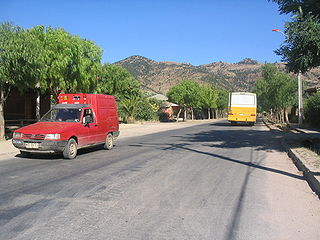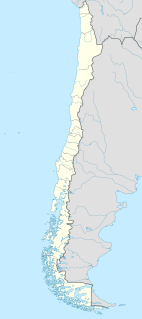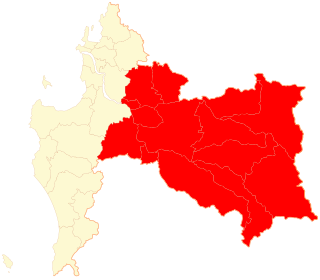
Chilean wine has a long history for a New World wine region, as it was the 16th century when the Spanish conquistadors brought Vitis vinifera vines with them as they colonized the region. In the mid-19th century, French wine varieties such as Cabernet Sauvignon, Merlot, Carmenère and Franc were introduced. In the early 1980s, a renaissance began with the introduction of stainless steel fermentation tanks and the use of oak barrels for aging. Wine exports grew very quickly as quality wine production increased. The number of wineries has grown from 12 in 1995 to over 70 in 2005.

The Libertador General Bernardo O'Higgins Region, often shortened to O'Higgins Region, is one of Chile's 16 first order administrative divisions. It is subdivided into three provinces. It is named in honour of Bernardo O'Higgins Riquelme, one of Chile's founding fathers.

San Fernando is the capital of the province of Colchagua, in central Chile, and the second most populated urban center of the O'Higgins Region. Located close to the Tinguiririca River in a fertile valley, San Fernando sits 339 m above sea level. Founded in 1742, it became the provincial capital in 1840.

Colchagua Province is one of three provinces of the central Chilean region of O'Higgins (VI). Its capital is San Fernando. It is bordered on the north by Cachapoal Province, on the east by the Argentine Republic, on the south by Curicó Province, and on the west by Cardenal Caro Province.

Lolol is a Chilean commune and town in Colchagua Province, O'Higgins Region. Lolol was founded in 1830.

The Roman Catholic Diocese of Rancagua is a suffragan diocese of the Archdiocese of Santiago de Chile. The diocese was established on 18 October 1925 as Diócesis de Santa Cruz de Rancagua, by Pope Pius XII by means of the papal bull Apostolici muneris ratio.

Santa Cruz is a Chilean city and commune, located in the Colchagua valley, in the O'Higgins Region, located on the southern shore of the Tinguiririca river, 110 miles from Santiago, Chile's capital city and 27 miles from San Fernando.

Colchagua Club de Deportes are a Chilean Football club, their home town is San Fernando in Chile. They currently play in third division of Chilean football, Segunda División de Chile. His traditional rival is O'Higgins.
The 1994 Campeonato Nacional, known as Campeonato Nacional Copa Banco del Estado 1994 for sponsorship purposes, was the 62nd season of top-flight football in Chile. Universidad de Chile won their eight title following a 1–1 away tie at Cobresal on 18 December. Universidad Católica also qualified for the next Copa Libertadores as Liguilla winners.
Cono Sur Vineyards & Winery is the third exporter of bottled wine in Chile.

Paniahue is a Chilean village located north of Santa Cruz, Colchagua Province, O'Higgins Region.
Leonardo Antonio Espinoza Nova is a footballer currently playing for Deportes Iquique of the Primera División in Chile.
Colegio Inmaculada Concepción is a Chilean high school located in San Fernando, Colchagua Province, Chile.
Colegio Valle de Colchagua is a Chilean high school located in San Fernando, Colchagua Province, Chile.
Colchagua is a Chilean village located in Quillón, Ñuble Province, Bío Bío Region. It is located close to the villages of Cerro Negro and Chancal.
Colchagua is a Chilean village located northwest of Palmilla, Colchagua Province, Libertador General Bernardo O'Higgins Region.
Barreales is a Chilean village located in Santa Cruz, Colchagua Province, Libertador General Bernardo O'Higgins Region.

El Puerto was a biweekly newspaper published in Pichilemu, Chile, by San Fernando newspaper editor Augusto A. Ramírez O.. El Puerto was only published in three issues: the first on 16 January and the last on 5 February 1908. It was the first newspaper published in the commune of Pichilemu, and aimed to be an "absolute and exclusive organ to the regional interests of Colchagua, especially [those] of the port of Pichilemu." El Puerto included a scientific section written by a physician, chronicles, and literary content such as poems.
The 2018 Copa Chile, was the 41st edition of the Copa Chile, the country's national football cup tournament. Santiago Wanderers were the defending champions, but lost to Palestino in the second round of the competition. Palestino went on to become champions after defeating Audax Italiano in the final by an aggregate score of 4–2.












